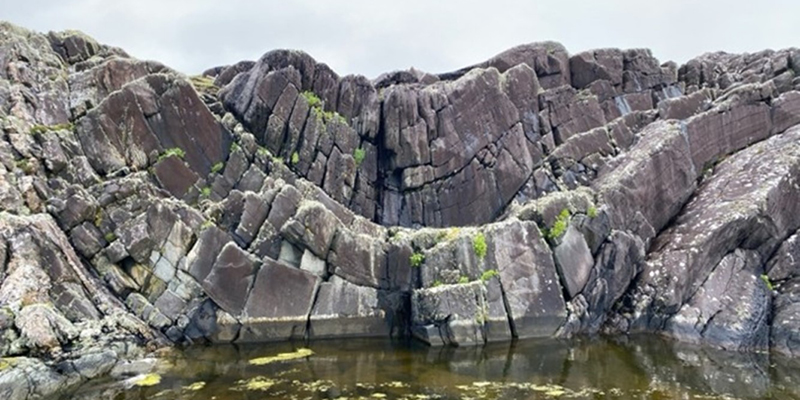EU awards €5 million to researchers for critical raw materials - the '21st century's gold' 05 Feb 2025

This project will allow us to understand the origin of the so-called critical raw materials, of vital importance for the energy transition. Over a period of four years, ForMovFluid “Marie Curie” researchers will tackle this challenge by combining cutting-edge laboratory techniques and field work in four different countries: Germany, Spain, Ireland and Scotland. This meets the growing needs of the European Union, which has recently regulated the need to move away from dependence on other countries and start exploiting mineral resources within its own boundaries.
The Earth's crust, a ‘living’ barrier
We live in a very dynamic planet. Although we used to think of the Earth's inner layers as fixed isolated divisions, this is not entirely true – events such as earthquakes and volcanic eruptions reshape our world, our landscapes are constantly evolving. Through faults and fractures in tectonic plates, fluids and gases are interacting with the rocks of the Earth's crust, changing their composition. Understanding such processes not only helps us know our home planet better but is vital in a world where the climate crisis is changing the rules of the game. The energy transition requires certain raw materials found in the Earth's crust, such as nickel, lithium and copper.
ForMovFluid aims to increase the current knowledge about the movement of fluids in the Earth’s upper crust and how they interact with rocks in different environments. This will help scientists understand how critical minerals are formed, and therefore know where and how to find them underground.
According to Dr Pat Meere, School of Biological, Earth and Environmental Sciences/ERI, University College Cork, and coordinator of the project, fluids play a key role in the origin and concentration of economically valuable mineral deposits: ‘The movement of these fluids in the Earth's crust is controlled by a series of physical and chemical processes operating at very different levels, from plate tectonics down to microscopic ‘rock grain’ scales.’
Essentials for ‘green’ transition
Critical raw materials (CRMs) are a set of 34 chemical elements and mineral resources vital to the European economy. CRMs are scarce, yet essential to certain strategic sectors, such as net-zero, electronics, and aerospace. As Meere explains, these CRMs are the building blocks of many renewable technologies: ‘Copper, lithium and nickel are required to make batteries, gallium for solar panels and boron for wind technologies’.
The EU currently relies heavily on 'single source’ countries for certain critical raw materials, such as magnesium (China, 97%), lithium (Chile, 97%), iridium (South Africa, 93%) and niobium (Brazil, 92%), making supply chains extremely vulnerable. In addition, some countries have begun to restrict their exports of these materials, such as China and its production of gallium and germanium, ‘two metals essential for micro-processors’, adds Meere.
ForMovFluid aligns with the EU's new Critical Raw Materials Act, which ambitiously aims to have 10% of critical raw materials consumption extracted within the EU's own borders. According to Meere, ‘this requires the training of increased numbers of geoscience researchers that have the appropriate skill sets to successfully drive raw material exploration and production programmes’.
The project is structured as a “doctoral network”, currently actively looking for up to 18 experts in 4 countries (https://formovfluid.eu/phd-positions/). During their doctoral studies, researchers will enjoy a unique opportunity to train in a fully multidisciplinary way by combining expertise in areas such as geodynamics, structural geology, petrology, geophysics, geochemistry and computational modelling.
The call for applications is open, any researcher who fits the eligibility criteria is encouraged to participate.
The ForMovFluid network is led by University College Cork and includes:
- Friedrich-Alexander University of Erlangen-Nuremberg, Germany
- Instituto de Geociencias (CSIC-UCM), Spain
- University of St Andrews, UK
- Deutsche ErdWärme, Germany
- SLR Consulting, Ireland
- Boliden Minerals AB, Sweden
- University of Evora, Portugal
- Aurum Exploration, Ireland
- Department of Environment, Climate and Communications, Ireland
- Universidad Complutense de Madrid, Spain
- AGATA Comunicación Científica, Spain
ForMovFluid is a Doctoral Network (DN) project under the framework of the Marie Sklodowska-Curie Actions (MSCA), the European Union’s reference programme for doctoral education and postdoctoral training.
Its funding, amounting to €5 million, comes from both Horizon Europe's MSCA programme and the UK's research and innovation funding agency (UKRI).